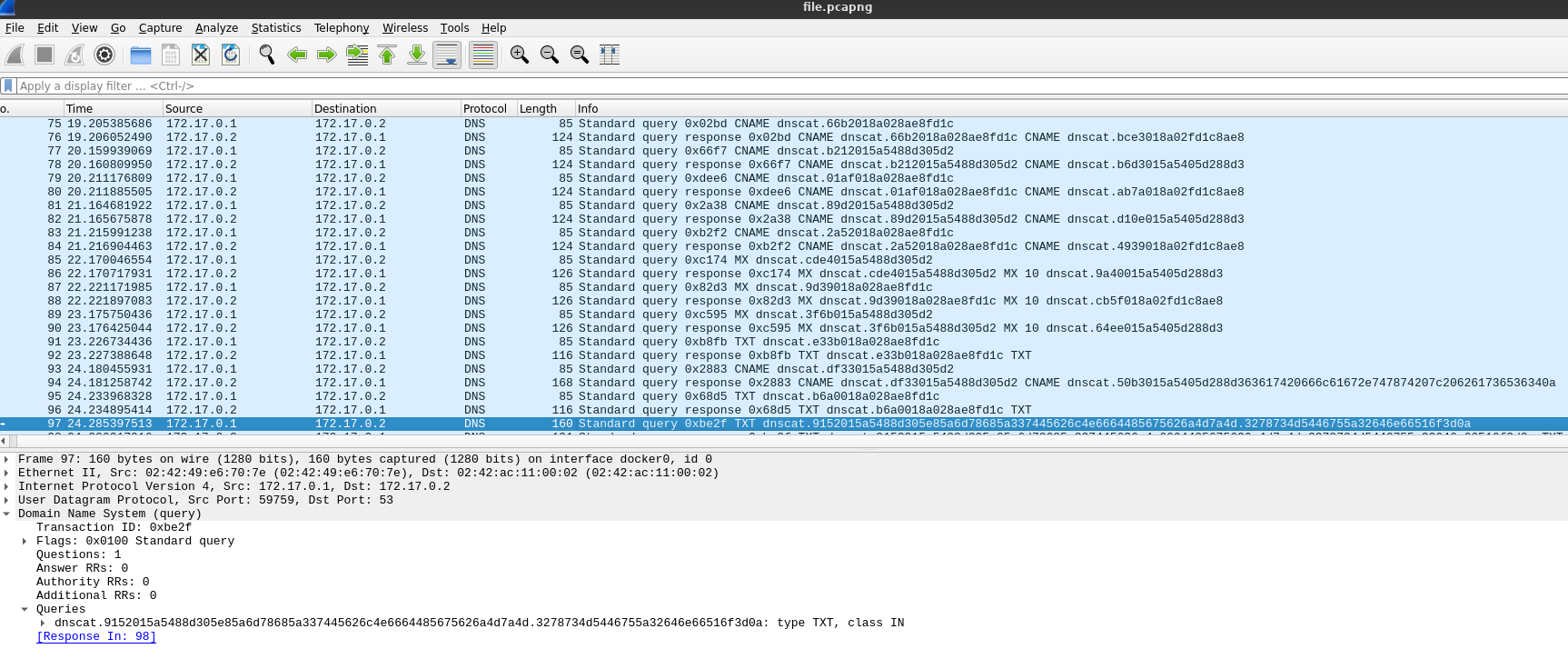Forensics
Broken Files
The challenge provides a challenge file of unknown type. I ran file against it, but this wasn’t helpful.
$ file ./challenge
./challenge: data
I looked at the hex dump with xxd and saw a reference to flag.txt towards the end, which indicated to me this was some sort of archive format.
00035530: 0102 1e03 0a00 0900 0000 91a1 1e55 cbbe .............U..
00035540: 17b1 2200 0000 1600 0000 0800 1800 0000 ..".............
00035550: 0000 0100 0000 b481 0000 0000 666c 6167 ............flag
00035560: 2e74 7874 5554 0500 0362 990e 6375 780b .txtUT...b..cux.
00035570: 0001 04e8 0300 0004 e803 0000 504b 0506 ............PK..
00035580: 0000 0000 0100 0100 4e00 0000 7400 0000 ........N...t...
00035590: 0000
I tried to unzip the challenge file, and it printed a warning but continued on to prompt for a password, so this seemed promising.
Archive: challenge
warning [challenge]: 218298 extra bytes at beginning or within zipfile
(attempting to process anyway)
[challenge] flag.txt password:
Naively extracting the hash with zip2john didn’t work because of the missing metadata in the previous warning. Stackoverflow provided a solution to repair the metadata.
$ zip -FF challenge --out fixed.zip
Now zip2john worked as expected.
$ zip2john fixed.zip > challenge.hashes
I tried to crack the hash with johntheripper and the classic rockyou wordlist but came up empty. Since the CTF is based in Argentina, I downloaded a Spanish language wordlist and produced the password.
vanamente
This allowed flag.txt to be extracted, revealing the flag.
flag{_B0rg3S_Th3R43l}
Professional Zip Cracker
This challenge unsurprisingly provides a challenge.zip. johntheripper and rockyou produced the first password.
puck02111987
Which extracted alittlemore.zip. This was cracked in the same manner, but with a different wordlist of unknown origin, to produce the next password.
gz
What turned out to be the final archive, flag.zip, was more resistant to wordlists and simple brute forcing. Eventually I became curious about the contents, and searching for pkzip.ps.gz revealed that it was a part of pkcrack, a zip cracking utility that requires a known plaintext file be present in the encrypted archive. Since pkzip.ps.gz is included in the encrypted flag.zip, and available unencrypted from pkcrack itself, I had everything I needed for the final step.
In preparation for running pkcrack I downloaded pkzip.ps.gz and zipped it up in a new unencrypted zipfile, making sure the compression mode matched afterwards with unzip -v flag.zip and unzip -v new.zip.
$ zip new.zip pkzip.ps.gz
$ unzip -v flag.zip
Archive: flag.zip
Length Method Size Cmpr Date Time CRC-32 Name
-------- ------ ------- ---- ---------- ----- -------- ----
74841 Defl:N 74321 1% 09-01-2022 19:05 11958b6d KP/pkzip.ps.gz
42 Stored 42 0% 08-29-2022 15:26 5dd7a68f flag/flag.txt
-------- ------- --- -------
74883 74363 1% 2 files
$ unzip -v new.zip
Archive: new.zip
Length Method Size Cmpr Date Time CRC-32 Name
-------- ------ ------- ---- ---------- ----- -------- ----
74841 Defl:N 74321 1% 09-27-2022 16:07 11958b6d pkzip.ps.gz
-------- ------- --- -------
74841 74321 1% 1 file
Then pkcrack decrypted the contents of flag.zip.
$ pkcrack -C flag.zip -c KP/pkzip.ps.gz -P new.zip -p pkzip.ps.gz
The flag was revealed.
flag{YouU_4r3_Th3_R34L_z1p_Cr444ck333r!!}
My Secret Tunnel
The challenge provides file.pcapng. Opened in wireshark, it contains some DNS traffic. Given the challenge name and the capture contents, this seemed likely to be DNS tunneling, and the appearance of dnscat references confirmed the theory.
I researched dnscat and found that the first 9 bytes of each transmission are not part of the payload, the rest is the hex encoded message.
I ultimately overcomplicated this one, and messed about with various scapy based python scripts to splice the various dnscat messages together and decode the result. In the end I just needed to decode the one message that was notably longer than the others.
$ echo 5a6d78685a337445626c4e6664485675626a4d7a4d.3278734d5446755a32646e66516f3d0a | xxd -r -p
ZmxhZ3tEblNfdHVubjMzM2xsMTFuZ2dnfQo=
And base64 decode it
$ echo ZmxhZ3tEblNfdHVubjMzM2xsMTFuZ2dnfQo= | base64 -d
flag{DnS_tunn333ll11nggg}
Crypto
Omelette du fromage Cipher
The challenge provides an encrypted flag.
hlrv{X1g3ett3_2_34sp_bcae}
Searching for the phrase Omelette du fromage brought me to an episode of Dexter’s Laboratory in which the phrase is repeated over and over. This felt like a clue that the cipher would use repetition. I tried a Vigenere cipher first. Since the first part of the ciphertext is known to say flag, I played around with adding key characters to an online Vigenere solver until I got flag to be produced in the plaintext output. Thankfully, that was the full key: carp, and the flag was revealed.
flag{V1g3ner3_2_34sy_maan}
Web
Basics
The challenge provides a URL to a domain with a file that simply contains the text Nothing. After poking around a bit at headers and cookies, I started on enumeration and checked the classic /robots.txt. Sure enough, this led me to /sup3rsecr3T.txt which had the flag in a flag response header.
flag{Header_HTTP_Rulessss}
Prog
Calculator
The challenge provides a domain and port to connect to with nc. Upon connection, you are prompted to solve some simple math problems, but the timeout is too quick to reasonably do so manually. I wrote a script to evaluate each of the provided expressions.
#!/usr/bin/env python3
from pwn import *
# the connection is terminated before a final newline, this prints the buffer contents
context.log_level = "debug"
conn = remote("calculator.ctf.cert.unlp.edu.ar", 15002)
conn.recvuntil(b":\n")
while True:
line = conn.recvline().strip()
try:
result = str(eval(line)).encode("utf-8")
except Exception:
print("COMPLETE")
while(True):
print(line)
line = conn.recvline()
conn.sendline(result)
print(conn.recvline())
I didn’t write down the flag :p
